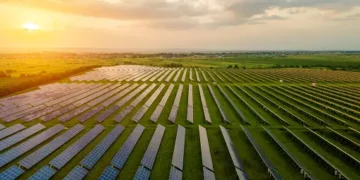NTT DoCoMo, a leading Japanese telecommunications company, has announced a comprehensive plan to achieve carbon neutrality in its supply chain by the year 2040. This initiative is part of the company’s broader sustainability goals, particularly targeting the reduction of scope 3 emissions, which represent the majority of its greenhouse gas emissions.
Scope 3 emissions are indirect emissions that occur in a company’s value chain, including both upstream and downstream activities. These emissions can be more challenging to manage compared to scope 1 and 2 emissions, which relate directly to a company’s own operations and the energy it consumes.
In pursuit of its sustainability objectives, NTT DoCoMo has previously committed to reaching net zero scope 1 and 2 emissions by 2030. Strategies to achieve this include the adoption of renewable energy sources, the implementation of power purchase agreements (PPAs), and the introduction of energy-efficient technologies within its operations.
The latest strategy extends these efforts to DoCoMo’s supply chain. The company has outlined several specific measures, such as transitioning all DoCoMo Shops to renewable energy by the fiscal year 2030 and favoring eco-friendly products for its procurement processes.
Additionally, NTT DoCoMo is advancing tools and services that promote environmental responsibility, like the ‘Caboneu’ ecosystem for customer carbon emission visualization and CO2MOS, a tool designed to help suppliers monitor and manage their CO2 emissions.
Supporting these initiatives, DoCoMo is providing green consultancy services and promoting Nexcenter, which advocates for the use of liquid-cooled equipment in data centers to significantly reduce energy use.
These actions align with the Japanese government’s ambitious goals to reduce the nation’s greenhouse gas emissions by 46 percent by 2030.
Comparatively, DoCoMo’s industry counterparts have set similar, albeit less stringent, targets. KDDI aims for net zero emissions from its business operations by 2030 and across its entire group by 2050. Softbank has also set a 2030 goal for scope 1 and 2 emissions, with a broader 2050 target for scope 3 emissions.
The industry-wide focus on scope 3 emissions is evidenced by initiatives like BT’s collaboration with SAP on the Sustainability Data Exchange (SDX), aimed at improving the collection and sharing of scope 3 data.
With predictions from IDC suggesting that 75% of large organizations will employ specialized ESG data management and reporting software by 2024, the trend towards greater transparency and accountability in corporate sustainability practices is becoming more pronounced. This movement seeks to bolster the credibility of corporate ESG efforts, which have faced scrutiny over the efficacy of carbon offsetting strategies.
Your go-to for supply chain report news updates: The Supply Chain Report. For international trade tools, see ADAMftd.com.
#NTTDoCoMo #CarbonNeutrality #SustainabilityGoals #Scope3Emissions #NetZero #RenewableEnergy #GreenTech #EcoFriendly #EnergyEfficiency #CarbonFootprint #SupplyChainSustainability #DoCoMoShops #Nexcenter #LiquidCooledDataCenters #GreenConsultancy #SustainabilityDataExchange #ESGTransparency #ESGReporting #BT #SAP #IDC2024 #JapaneseTelecom #CarbonEmissionVisualization #CO2MOS #PowerPurchaseAgreements #CleanEnergyFuture















